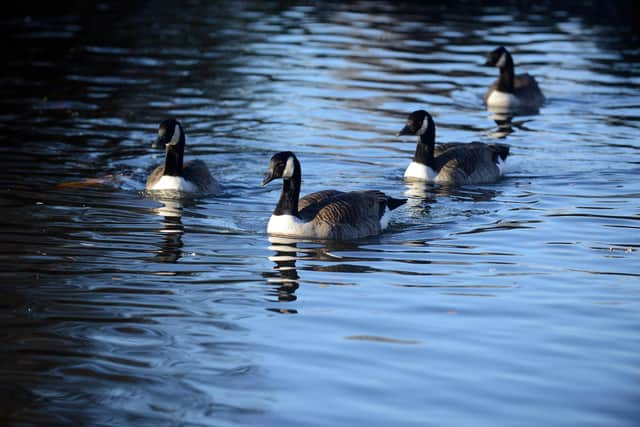Bird flu fears: Around 4,000 deaths in 'biggest' outbreak for years
Wildlife experts said around 4,000 birds have died in the 'biggest' outbreak of bird flu in recent years.
As many as 4,000 Svalbard barnacle geese have been found dead on the Solway Firth, which forms part of the border between Scotland and England.
Advertisement
Hide AdAdvertisement
Hide AdThe birds make the journey from Svalbard, north of the Arctic Circle, with visitors flocking to the coast to see tens of thousands of the birds spending their winter there.


But this year avian flu has killed around 4,000 of the geese who have made it to Scottish shores.
Conservationists at the RSPB said around 10 per cent of the Svalbard barnacle geese population have died.
They said the outbreak is 'easily the largest and most widespread' in recent years.
Paul Walton, RSPB Scotland's head of habitats and species, said the organisation was treating the outbreak 'very seriously'.
He warned people who feed birds in their gardens to take extra care and hygiene precautions when topping up or changing food.
Mr Walton said: "We are currently seeing the biggest bird flu outbreak of recent years which is adding yet more pressure to our already beleaguered wild bird populations.
"The presence of the High Pathogenic Avian Influenza (HPAI) virus in all UK countries, in both poultry premises and wild birds, and the high numbers of dead and sick birds now seen, is generating growing concern among conservationists and nature lovers.
Advertisement
Hide AdAdvertisement
Hide Ad"The current outbreak of HPAI has been evident for several weeks, and is easily the largest and most widespread outbreak in recent years.
"A range of poultry operations are involved across the UK.
"The wild bird species involved are mostly wild geese, ducks and swans, but there have also been a number of birds of prey confirmed to have died from AI.
"We do not know the source of the outbreak and AI is known to circulate at varying levels in wild bird populations, and also in poultry and poultry products.
"Movements of poultry around and between countries, and the migrations of wild birds, are both known vectors of the virus.
"Of note is the situation on the Solway where ornithologists estimate 3,000-4,000 barnacle geese have died from AI.
"This is significant as it represents around 10 per cent of the population of Svalbard barnacle geese that overwinter on the Solway.
"Birds can be infected with the avian influenza virus through contact with infected individual birds or waste products.
"Wild birds including waterfowl can carry and transmit the virus without showing evidence of disease.
Advertisement
Hide AdAdvertisement
Hide Ad"The RSPB is taking this outbreak very seriously and we are following the government guidance on our reserves and implementing biosecurity measures where needed.
"Although the risk of contracting the disease from a wild bird is very low, we recommend that people do not handle sick or dead wild birds, remain vigilant, and report dead wild waterfowl (swans, geese or ducks), gulls or birds of prey to the government helplines.
"Everyone, at all times but especially now, should take care to maintain good hygiene when feeding garden birds - regularly cleaning feeders outside with mild disinfectant, removing old bird-food, spacing-out feeders as much as possible and washing your hands."
Comments
Want to join the conversation? Please or to comment on this article.